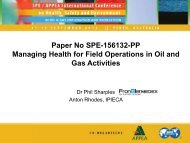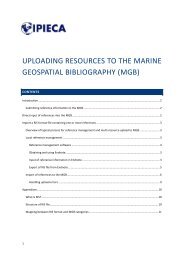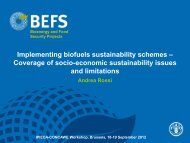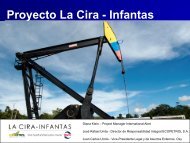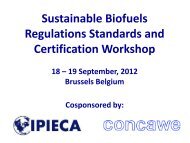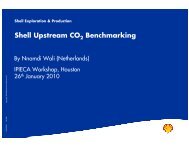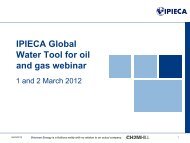WSSD Report FINAL! - OGP
WSSD Report FINAL! - OGP
WSSD Report FINAL! - OGP
You also want an ePaper? Increase the reach of your titles
YUMPU automatically turns print PDFs into web optimized ePapers that Google loves.
CONTRIBUTING TO SUSTAINABLE DEVELOPMENT<br />
Waste management<br />
●<br />
In refining, sludge coking is a recognized<br />
and widely used practice in which the<br />
heavy organic constituents in refinery waste<br />
are converted to petroleum coke while<br />
light hydrocarbons and water are<br />
vapourized, recovered and reused. Refiners<br />
have optimized their processes by recycling<br />
oily wastes during part of the coker cycle,<br />
or by transforming recovered hydrocarbons<br />
into asphalt, which can then be offered to<br />
local communities for use as road surfacing.<br />
Prevention of gas or fumes from escaping into the<br />
atmosphere is an overriding objective in all our<br />
operations, including production, refining and<br />
product transfer. Venting and flaring have been<br />
significantly reduced in all of these activities.<br />
Changes to operating procedures and installation of<br />
vapour recovery units have also reduced atmospheric<br />
discharges from tanker loading operations,<br />
product distribution, terminals and fuelling stations.<br />
Crude oil undergoes a variety of specialized<br />
transformations in refineries to turn it into a<br />
wide assortment of products. The process of<br />
removing naturally occurring impurities from<br />
raw crude unavoidably results in the generation<br />
of by-products that must be managed—either<br />
by recycling, treatment or disposal.The majority<br />
of recycling residuals fall into three categories:<br />
● Substances added to absorb petroleum<br />
contaminants such as hydrogen sulphide,<br />
which are then removed;<br />
● Micro-organisms used to purify water<br />
needed during the refining process;<br />
● Solids present in crude oil or generated<br />
either in the process of cleaning up spills or<br />
excavating refinery construction sites.<br />
Over the past 15 years, refineries have documented<br />
the effective measures they have taken to<br />
operate more efficiently, conserving resources<br />
and generating less waste for disposal. According<br />
to the most recent data, refineries now recycle<br />
62 per cent of refinery residuals versus 26 per<br />
Operational discharges of oil into the marine<br />
environment from European production<br />
platforms have been reduced by 64 per cent<br />
cent in 1985. Solvents, resins and other materials<br />
are restored for re-use within the refinery or<br />
elsewhere. Another 21 per cent of refinery residuals<br />
are treated to reduce their volume and/or<br />
toxicity before disposal. The volume of refinery<br />
residuals sent for direct disposal fell from 28 per<br />
cent in 1985 to 18 per cent in 1997.<br />
A large portion of our products is used in<br />
motor vehicles, which are an indispensable fact<br />
of life for a significant part of the global population.<br />
Motor oil does not wear out. It just gets<br />
dirty. Therefore, what we do with the used oil<br />
from these vehicles plays an important role in<br />
balancing our desire for convenient transportation<br />
with the imperative for a clean and healthy<br />
environment now and in the future. By recycling<br />
used motor oil we keep it out of rivers,<br />
lakes, streams and ground water. In many cases<br />
that means keeping it out of our drinking<br />
water, off our beaches and away from wildlife.<br />
Our industry is promoting the development of<br />
multiple recovery and reuse operations for used oil<br />
such as burning for energy recovery or re-refining<br />
to base lubricants oil using modern technology.<br />
Many regional petroleum industry associations<br />
around the world have instituted used oil management<br />
programmes to educate consumers that oil<br />
taken to a collection centre for recycling saves<br />
energy and conserves natural resources.<br />
Reprocessing is the most common method of<br />
recycling used oil in the US. Each year processors<br />
treat approximately 750 million gallons of<br />
used oil. Some 75 per cent of used oil is being<br />
processed and marketed and another 14 per<br />
cent is turned over to re-refiners who return<br />
used oil to its virgin state.<br />
65



